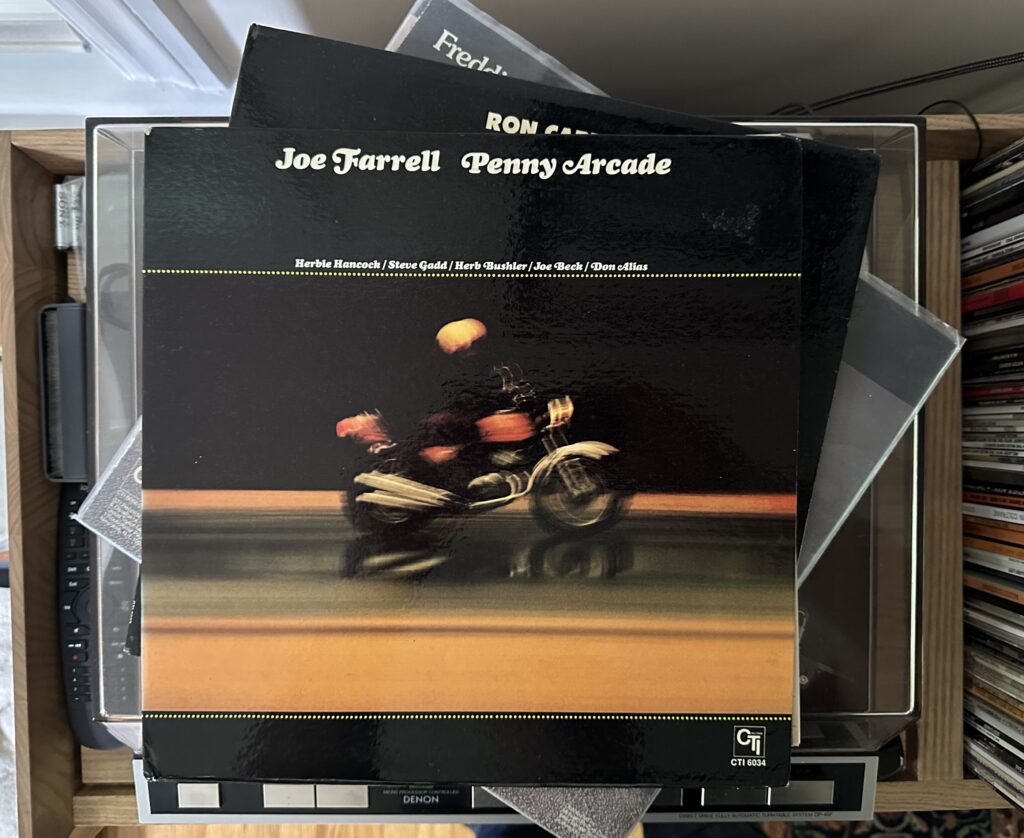
Album of the Week, July 29, 2023
After the bombast of the last two weeks, one might see the cover of this week’s #albumoftheweek and think: phew. Small group straight ahead jazz. You’d be right about the group size—Joe Farrell brought a sextet into the studio this time, with Herbie Hancock returning on piano and adding Joe Beck on guitar, Herb Bushler on bass, Steve Gadd on drums, and Don Alias on congas. However, rather than straight-ahead sounds, this album continues the turn to jazz-funk that began on Farrell’s previous CTI date, Moon Germs.
In fact, since that record, Farrell had been playing a lot of jazz-funk, and so had his band. Penny Arcade was recorded in October 1973, a month after Herbie Hancock recorded the galactically funky Head Hunters. Steve Gadd had played sessions with Johnny Hammond and the earlier, funkier incarnation of Chuck Mangione’s band. Don Alias had, of course, played with Miles on Bitches Brew, and also played in the Tony Williams Lifetime. Herb Bushler had also played with the Lifetime and also with Melvin Van Peebles. And Joe Beck had played electric guitar on Miles’ “Circle in the Round,” the trumpeter’s first session with an electric guitar, and had performed with a number of jazz and funk combos, including a number of session tracks for James Brown. In fact, it’s likely that Farrell met Beck in Brown’s band, since both played on Get on the Good Foot.
And the album definitely shows its funk roots, though it takes a minute to get there. “Penny Arcade” starts out as a more conventional quintet number, but Joe Beck’s wah-wah laden solo quickly shifts things into the funk zone. Farrell’s solo is less adventurous than many on his early ’70s output as he sticks close to the melody, and the pocket.
That brings us to the mighty “Too High.” The opening is a faithful cover of the Stevie Wonders classic, thanks to some tasty keyboard work from Hancock, Farrell’s soprano sax, and the combined electric onslaught of Beck and Bushler. Herbie’s keyboard playing gets richer and stranger behind each iteration of the chorus, which repeats three times before Farrell takes a solo. Here he’s a little less tethered to the literal melody of the tune and it opens up into a modal exploration over top of a squelchy, funky rhythm section. Farrell’s solo continues, bridging between straight ahead melody, funky rhythm, and avant-garde voicings, before returning to the chorus. Hancock’s solo is full of the melodic flourishes that he brought to Head Hunters, but in a more limited palette; he confines himself to the Fender Rhodes, rather than the riot of synthesizers that appeared on his earlier album. Toward the end of the solo, he extends the tonality into a more explicitly minor key before returning to the melody. Bushler builds a solo around the bent notes of the hook, Beck supporting him with an increasingly spare rhythm until he drops out entirely. The final chorus narrows to a plaintive note from Farrell before returning for a coda. It’s the highlight of the album.
“Hurricane Jane,” by contrast, is a brighter uptempo number that opens with a more prominent Beck over the unified rhythm section, with Farrell sitting back further in the mix. The mood changes and clouds of Echoplexed Fender roll in for a few measures, and then it’s right back to the funk as Farrell takes a fierce Maceo-flavored solo.
“Cloud Cream” begins with Don Alias’s congas and a dual lead on the soprano sax and the Fender. It keeps its salsa flavor going through the first two minutes, then segues to a double-time section before relaxing back into the rhythm, led by Farrell on piccolo. The track is lovely and straightforward, and sets up the closer, “Geo Blue.” Pivoting between slower balladic moments and straight ahead groove, the track seems to sum up the funk, melodic feel, and approachability of the album. It is the most versatile set of sounds on the album, featuring a lovely and effects-free solo from Beck, an acoustic piano interlude from Hancock, and a recurring solo from Farrell on tenor sax that’s plaintive and winsome by turns.
Farrell thus managed a transition from avant-garde leaning straight ahead jazz to pure jazz funk and retained much of his credibility in the process. It’s a hard thing to do, and critics panned the follow-up efforts Upon This Rock and Canned Funk. Those albums were still loved by MCs, though, and were sampled by Kanye West and A Tribe Called Quest, among others. In 2008, 22 years after her father’s death, Farrell’s daughter sued West, Method Man, Redman and Common for sampling “Upon This Rock” without permission. She quietly settled the suit. So though Farrell may not have had a long career, his recordings lived on—and continued to earn money for the family. Next week we’ll hear from another CTI stalwart who is still recording today.
You can listen to the album here:
